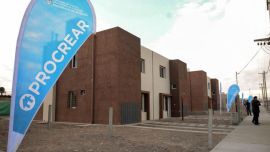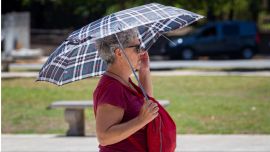Alberto Fernández’s march to the threshold of Argentina’s presidency began in the upstairs room of a Buenos Aires bar.
It was February of last year, late summer in the southern hemisphere, when the law professor and onetime Cabinet chief convened members of his recently formed think tank, Grupo Callao, to weigh the political options.
Early 2018 was an inauspicious time to even consider challenging the incumbent: President Mauricio Macri was basking in the glow of a mid-term electoral victory while preparing for a spell in the international limelight as host of the Group of 20 nations. Even the economy, Argentina’s perennial Achilles Heel, was showing signs of recovery in response to Macri’s market-friendly reforms.
Over “picadas” — cheese and charcuterie plates that Argentines nibble on for hours — Fernández outlined a strategy to his colleagues seated at a long table in the bar’s secluded upper level.
His plan was to unite Peronism, Argentina’s dominant political movement that traditionally favours workers over business owners, which had fragmented in recent years. And that would mean reconciling with his longtime foe, Cristina Fernández de Kirchner, the former president.
Eighteen months later, Fernández trounced Macri in a primary vote, and pretty much everyone in Argentina expects him to do so again in the official presidential election on October 27. The likely key to that success — and the source of Fernández’s biggest potential dilemma — is the improbable inclusion of Fernández de Kirchner on the ticket as his deputy, not his boss.
This story of how Fernández brought Argentina to this point is based on interviews with his senior campaign staff, close friends and former government leaders, some of whom asked not to be named discussing the presidential candidate. The frontrunner didn’t respond to interview requests made through his spokesman.
Ascent and influence
Fernández’s ascent is an audacious political gambit that nevertheless has investors and Argentina’s creditors, not least the International Monetary Fund (IMF), bracing for turmoil. They question Fernández de Kirchner’s influence: During her eight-year tenure, she implemented currency controls, kept the country in default and faked economic data, cutting Argentina off from global markets. With those memories still fresh, the peso plunged 26 percent in August after Fernández’s primary victory and sovereign bonds suffered a historic collapse.
For Macri’s opponents, a Fernández-Fernández de Kirchner government can’t come soon enough. The question remains, however, which path Fernández, the ultimate political insider, will take if he makes it to the presidential palace — and Fernández de Kirchner’s role in his decisions.
Fernández de Kirchner hasn’t yet asked Fernandez to let her choose a single minister, according to one senior campaign official, who insisted that Fernández will control policy.
“Alberto will be in charge of the government,” said Jorge Argüello, Argentina’s former ambassador to the United Nations and Fernández’s friend of 40 years. “He’s learned how to build up power.”
One indication of his direction is offered by the Grupo Callao, named after Avenida Callao, a main artery of the capital that runs past Congress and Fernández’s personal office. Its original members are emerging as his top aides on the road to the presidency.
Among them are campaign chief Santiago Cafiero, whose grandfather served as Juan Perón’s trade minister and whose father was ambassador to the Vatican during Cristina Fernández de Kirchner’s administrations. Santiago recruited Matías Kulfas and Cecilia Todesca, two former Central Bank officials, who now spearhead Fernández’s economic team.
Analysts say Fernández will be more moderate than investors fear. Yet his economic agenda still presents a challenge: He says he will raise salaries, lower interest rates, ease inflation and aim for fiscal and trade surpluses, all while growing the economy. He won’t default on the nation’s debt, but instead plans to renegotiate with private creditors and separately with the IMF over the record US$56-billion bailout Macri requested.
“What I think he’s saying is that reaching those objectives can’t come at the cost of rising poverty and unemployment,” said Miguel Pesce, a former Central Bank vice-president who’s known Fernández for over 15 years.
Man for all seasons?
Born in the City of Buenos Aires, Fernández, 60, is a pragmatist who knows Argentina’s bureaucracy inside out and listens to policy makers across the spectrum, without grasping onto ideology. It’s part of his man-for-all-seasons persona.
Fernández plays guitar — he named his dog “Dylan” after the musician — loves football, writes poetry and idolises Walt Whitman. Once married and divorced, his partner is a 38-year-old journalist and actress, Fabiola Yáñez. He has one adult son, Estanislao, who moonlights as a drag queen. Fernández’s campaign promises to focus on the poor and marginalised, yet he lives in a high-rise block in the capital’s most chic neighbourhood.
His introduction to politics was as a student activist at the University of Buenos Aires during Argentina’s last military dictatorship. He worked in government in the mid-1980s after the return to democracy, then landed an economic post in president Carlos Menem’s administration. But by 1995, Fernández was fed up with Menem and quit. It was a pattern he would repeat under the Kirchners.
Fernández started a roundtable with husband and wife Néstor Kirchner and Cristina Fernández de Kirchner in 1998, five years before Néstor won the presidency. He took a leap of faith, since at the time Néstor was a little-known governor from a remote province in distant Patagonia.
The two became close, and Néstor appointed Fernández as first his campaign chief and later, chief of staff. Fernández gained a reputation which he still holds today for having a short temper. He adopted the president’s centralised power structure — only meeting one-on-one with ministers and never holding Cabinet meetings.
“Alberto likes to keep everyone spread out,” said Eduardo Valdés, a friend from college who introduced him to the Kirchners in 1997. “Nobody knows what he said to the other one.”
Fernández held the post all through Kirchner’s four-year term. But when Néstor stepped aside for Cristina, Fernández remained in his position for just six months before resigning after she tried to raise export tariffs, sparking a crisis between the government and farmers.
He left with a reputation as a skilled negotiator operating largely out of sight of the public — and a festering rift with Cristina. Fernández went on to support Fernández de Kirchner’s political opponents and berate her leadership.
“I really struggle to find one commendable element of Cristina’s second term in office,” he said in a 2015 TV interview.
Reconciliation
The reconciliation that could change Argentina was confirmed on a bone chilling May evening in Buenos Aires, as thousands gathered in the driving rain to hear Cristina speak publicly for the first time in months. Kirchner, by now more than three years removed from her presidency and the subject of myriad corruption allegations, was presenting her memoir, Sinceramente.
Fernández sat in the front row.
Her supporters hung to Fernández de Kirchner’s every word, hoping she’d announce another bid to become president. Instead, she planted the seeds for a political twist nobody saw coming.
The former president thanked her former Cabinet chief for giving her the idea to write the book. In doing so, she was raising the curtain on their joint campaign: 10 days later, it was Fernández Kirchner who announced that she’d be running for vice-president with Fernández as the lead candidate.
Speculation has swirled as to the reason for their rapprochement. According to friends and campaign officials, the two began to talk again and slowly heal their divide after Fernández de Kirchner suffered two stinging electoral defeats, forcing her to rethink her strategy.
If the game plan proves a winning one on Sunday, Fernández still faces a daunting task balancing competing demands from Fernández de Kirchner’s core populist base for more social spending with those of Argentina’s creditors. What’s more, he must do so having never served as a governor, mayor or even congressman.
“The issue isn’t that Alberto isn’t known abroad — in Argentina they don’t know Alberto,” said Camila Perochena, a political science professor at University of Torcuato Di Tella in Buenos Aires. “It’s really hard to predict what a person is going to do when he was never the front man, but the politician behind the scenes.”
by Patrick Gillespie & Jorgelina do Rosario, Bloomberg


























Comments